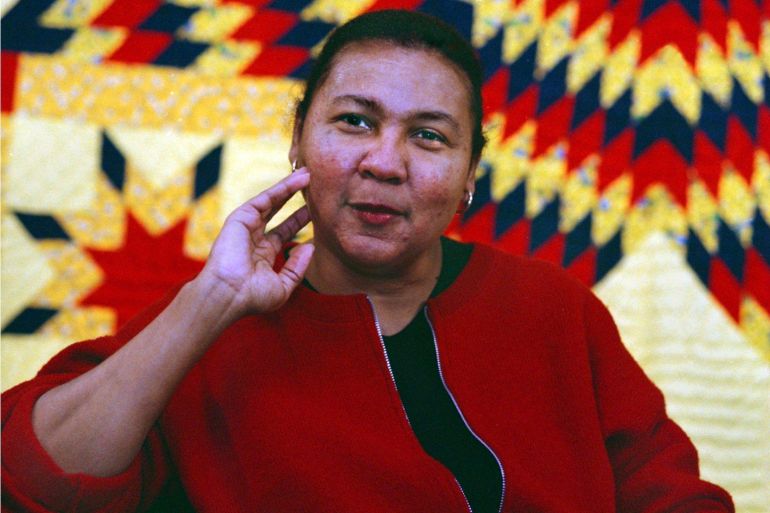bell hooks: A Black American voice that reached the world
hooks embodied the ability of Black Americans to call attention to their country’s sins and to do so from a position of marginality and authority.

The tributes that poured in for bell hooks, who died this week aged 69, affirmed the singular place she occupies in the Black intellectual canon.
She was the author of dozens of books and hundreds of journal articles and popular reviews on patriarchy, capitalism and white supremacy. Born in 1952, hooks was slightly younger than Toni Morrison, Angela Davis and Alice Walker, but she walked a similar path.
The moral and intellectual power of the United States has long been on the decline, but it is not for nothing that the writing and theorising of Black writers from that country have had a hallowed place in the intellectual lives of people who live in the Global South. In part, the brightest African American minds continue to inspire precisely because their country continues to be so deeply disappointing.
hooks embodied the ability of Black Americans to call attention to their country’s sins and to do so from a position of marginality and authority. She was part of a long tradition of critique that has allowed America’s finest Black thinkers and artists to connect with the world. And hooks took her place in this tradition seriously. She wrote from a position of absolute clarity, and was often both direct and loving in her critiques.
Indeed, this week, as her readers and students farewelled her, there was a lot of talk about “love” – a word that came to be closely associated with hooks’ body of work.
At the peak of her career, hooks published a trilogy of books about love that spanned the personal and the political. The trilogy addressed the devastating effects of rage and anger and – long before the current self-care craze – it sought to offer a theory of self-love.
In part, hooks’ ideas about love drew from her Buddhist practice and from her admiration for Thich Nhat Hanh, who founded the Engaged Buddhism Movement in response to the Vietnam War.
hooks once told an audience that she met Nhat Hanh on a day that had been full of “bad racial encounters”. When she approached the legendary monk, hooks later confessed, “I felt that here I was in front of this wonderful teacher and all I could pull out was the ugliness and the mess of my rage and of course he met that rage with loving kindness.” Nhat Hanh was patient with hooks, affirming her anger and telling her, “Oh, hold on to your anger and use it as compost for your garden.”
hooks took that message to heart. Her anger fuelled her writing and was responsible for the long reach of her pen. Her ideas on oppression and its eradication influenced people in classrooms, but they extended far beyond the American campuses where she taught.
In the mid-1990s, when I was just starting my career in international development, I was given a copy of an essay by hooks. It had been written a decade earlier, in 1984, but it spoke to me directly, critiquing the kind of white feminist internationalism that was dominant in the conference rooms I was trying to navigate. hooks argued that, “Many white women have said to me, ‘we wanted Black women and other non-white women to join the movement,’ totally unaware of their perception that they somehow ‘own’ the movement, that they are the ‘hosts’ inviting us as ‘guests’.”
I remember sitting upright. I finally had the framing to express my discomfort, and so, I had a way to challenge and push and become more effective in my work. I was in Johannesburg, far from the American contexts in which hooks wrote, but her words reached me.
In part, her effectiveness was tied to the fact that hooks wrote about issues that mattered. She had a particular interest in dissecting popular culture. By focusing on American films and movies – which have become borderless – hooks was relevant to readers everywhere.
I didn’t always agree with her commentary in recent years. She called Beyoncé a terrorist and then critiqued Lemonade by suggesting the visual album was both a beautiful embrace of Black womanhood and a continuation of old racialised and sexualised tropes.
In these exchanges, she was not out of her depth, but she seemed to have reached the limits of her theory-making. She had grown up in a world in which capitalism was the enemy, but she could not grasp that late-stage capitalism has forced many women into such precarity that resistance often looks a lot like capitulation. Capitalism has so thoroughly triumphed that the very definition of radicalism has been altered. Younger feminists understand this intuitively and much of their work seeks to understand this new terrain. Still, there was no denying the cogency of her arguments and the space for free thinking created by her contrarian views.
As hooks was mourned this week, I was struck by how much she had written and spoken, and by how seriously she endeavoured to critique power. But I was even more taken by how much she lived her own words. hooks insisted that, “The function of art is to do more than tell it like it is – it is to imagine what is possible.”
bell hooks is gone, but she left clear instructions. Wherever we are in the world, we must use her words – and our own – to create new visions.
The views expressed in this article are the author’s own and do not necessarily reflect Al Jazeera’s editorial stance.
